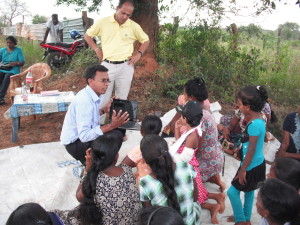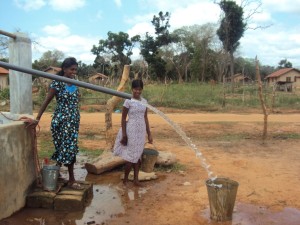by Renuka Jeya Raj
Drive carefully along the rutted road. Red soil and sparse vegetation bathed in dust greet you on every side, shimmering in the hot, dry, heat. An occasional village relieves the monotony of the lonely landscape. Here is a stark beauty that defies description. Then, a sudden burst of life. Children, chattering excitedly, run to meet your vehicle, in eager anticipation of a change to the otherwise monotonous routine of their lives. Their mothers follow slowly, and hold back demurely. You have reached Ponnagar, a community of fifty households comprising 134 people, situated in the Mullaitivu district of the North Central province of Sri Lanka. There are few young men about, most of the men you see are either old or disabled. This is a community of newly resettled returnees on whom the internal conflict had taken its toll. Most of these households are now headed by women as their menfolk have been lost in the war.

The community suffered from an acute lack of water. The people grew small crops of vegetables like manioc, brinjals and tomatoes to meet their daily needs, but these crops were sparse because of the lack of an adequate water supply. Water sources were limited to a deep well from which the women found difficult to draw water. The climate was fairly dry and had a scattered rainfall which averaged at 1200 mm towards the end of the year.
This community was part of the Community Resettlement Project supported by the International Organization for Migration (IOM) which was working to rehabilitate communities in post-conflict areas. IOM invited IWMI to use its expertise to source a regular water supply for the community’s agriculture and household needs.
Lal Mutuwatte, Hydrologist/ Mathematical Modeler, IWMI, and Nishadi Eriyagama, IWMI’s Water Resources Engineer, visited the community in May 2013 and carried out a data analysis based on a ground survey, which discovered the presence of a pure and continuous water supply underground. IWMI took rainfall data and created a graph which showed that rainfall occurred continuously during four months of the year. This was followed by an analysis and field investigation of groundwater levels. They found that groundwater levels varied in the area, from shallow to deep.

IWMI proposed construction of four wells from which water could be pumped into tanks using solar power. Solar panels were purchased at a discount from a private company. Water is now pumped by solar power into four 5000 litre tanks that feed crops and households.
In a letter of appreciation to IWMI’s Head, Sri Lanka Development Initiative, Dr Herath Manthrithilake, Guiseppe Crocetti, Chief of Mission of the IOM to Sri Lanka and the Maldives, said. “Your support provided through expert advice made it possible to resolve their water issue… presently 134 people settled in the housing scheme are benefitting through this program appreciated by both the community and the government stakeholders. (Your involvement) made a huge difference for the people in Ponnagar housing scheme.”
”We felt a great sense of achievement when we saw the smiling faces of those women when water flowed from the tank, said Lal Mutuwatte. “This is an example of how IWMI’s research can impact communities.”

